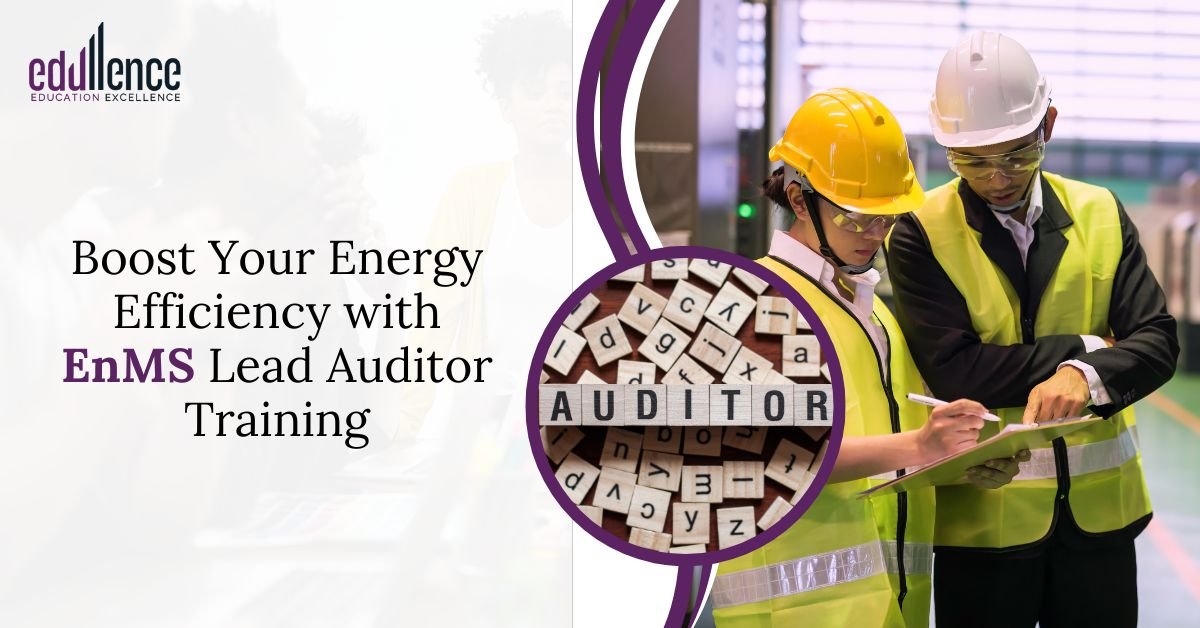Understanding Energy Management Systems (EnMS)
What is an EnMS?
EnMS Lead Auditor Training: An Energy Management Systems is an organized framework by which organizations can strive for enhancements in their energy performance systemically and methodically. This based-on-principles system, derived from data analysis, goal-setting, and constant monitoring, is a roadmap for lower energy consumption and the development of better operational efficiency. EnMS is not a one-size-fits-all kind of approach but rather an adaptive process toward the best energy needs of the organization.
Role of ISO 50001:2018 EnMS Lead Auditor Training Course
It offers companies a robust framework to ensure action taken on aspects of energy efficiency becomes part of daily activities and strategy for businesses. The standard is also able to provide business organizations with the ability to surpass regulatory requirements and realize huge savings in terms of energy consumption. By application of the model of continuous improvement, organizations are challenged to break their routine habits while forming an energy-conscious culture for making decisions. The ISO 50001:2018 EnMS Lead Auditor Training Course is the key activity that empowers professionals to audit and improve their organization’s energy management practices effectively.
Why Energy Efficiency Matters for Organizations
How Do Organizations Save Money with Energy Efficiency?
Energy use is one of the largest operational expenses for most organizations. Energy savings can be a quick win to the bottom line. An EnMS allows companies to identify areas where energy is being wasted and implement ways to deal with solutions that may curb the wastage. These savings can be invested elsewhere in the business, to spur growth and innovation. A well-run EnMS will not only provide one-time savings but also a way to continually reduce the cost of energy over time.
Environmental Impact and Corporate Responsibility
Apart from the monetary benefits, organizations are increasingly accountable for minimizing their impacts on the environment. Energy savings are directly translated into reduced carbon emissions and other greenhouse gases; hence, a well-implemented EnMS puts firms on the global sustainability agenda. Public stakeholders are growing ever more responsive to environmental issues; an EnMS implementation signals that a firm is responsible with energy resources and corporate sustainability. It may even improve a firm’s brand, making it more appealing to sensitive ecological consumers as well as investors.
The Potential for Change in an EnMS
Find and Optimize Energy Use
The EnMS has one of the most transformational features: the ability to identify inefficiencies that are unknown to the organization. Through energy audits and data collection, it is possible to identify exactly where and how energy is consumed often with very surprising optimization opportunities. Whether it’s optimizing HVAC systems, updating lighting installations, or streamlining production processes, an EnMS provides real-time insights that ultimately lead to great energy savings. The ability to track and measure energy consumption also means organizations can always look to refine their practice, always improving a little each day.
Continuous Improvement and Long-term Benefits
An EnMS is not about making changes one time; it’s about creating a culture of continuous improvement. With advancing technology and new opportunities to save energy, the EnMS framework allows organizations to adapt and change with the times. Ongoing efforts gradually allow the benefits of an energy management systems to emerge. Energy costs decline, operational efficiency improves, and the environmental profile grows stronger, all leading to long-term success. Moreover, ISO 50001:2018 certification can place companies at the forefront of energy efficiency while staying ahead of their competition in the market.
Steps to Implementing an Effective EnMS
Energy Policy and Objectives
The first step in implementing an EnMS would be to have a clear energy policy. This policy demonstrates the organization’s commitment to improving energy performance and provides a starting point for setting measurable objectives, such as reducing energy consumption by specific percentages, integrating renewable energy sources, or upgrading monitoring systems for energy use. By doing so, organizations establish clear, actionable goals that create a meaningful roadmap for energy savings.
Monitor and measure energy performance
Significance of EnMS Training
Benefits of the ISO 50001:2018 EnMS Lead Auditor Training Course
The success of a sound and sustainable EnMS is purely because of well-trained professionals with a pragmatic view of the intricacies associated with energy management. Therefore, the scope of the ISO 50001:2018 EnMS Lead Auditor Training Course is quite wide, training in auditing as well as improvement of energy management systems. This course will train and equip participants on auditing the energy use of an organization to identify wasteful areas and make recommendations appropriately; this course is based on the ISO 50001:2018 norm. Better energy savings can be rewarding for organizations in terms of trained key personnel in the auditing of EnMS.
Empowering Teams to Drive Energy Efficiency
It’s not only the training for the auditors, but this is equally applicable to all the teams of people dealing with energy management. An aware employee turns out to be an active participant in the organization’s effort toward energy efficiency. In such a way, behavior turns into a sustainable culture of the organization wherein every individual turns out to be responsible for saving and minimizing energy resources. Doing so, organizations end up investing in ISO 50001:2018 EnMS Lead Auditor Training Course, so the teams work their way toward informed decisions to make an organization garner maximum savings in energy, which would eventually change the way energy management is done within an organization.
Conclusion
An EnMS will make the organization focus on systems related to energy use, facilitating effective resource utilization, smooth-running processes, and sustainability. In this regard, the ISO 50001:2018 framework, paired with proper education, enables firms to achieve immediate bottom-line savings while fostering a culture of continuous improvement. This proactive approach benefits the bottom line and enhances corporate environmental responsibility, improving corporate reputation. By adopting an EnMS, companies can contribute to energy efficiency and work towards a greener future and long-term success. For expert guidance in this area, trust Edullence Education Excellence to help you lead the way.


